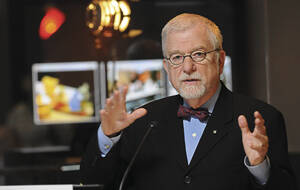Breaking into a career in television would have been impossible for me without the intellectual and emotional support of my religion. Summoning the courage to speak freely and truthfully to political officials, corporate leaders and television stars is much easier when you remember that everybody is equal in the eyes of God. That mixture of humility and courage has been present whenever my faith and my working life have intersected.
There were times when being a Catholic in the television business gave me an extra, though necessarily private, sense of pride in my work. In a television studio about a mile from ground zero on Sept. 12, 2001, my friend Msgr. Jim Lisante was a guest of Bill Moyers on a live national broadcast. Bill had invited religious leaders into the studio to discuss the moral and spiritual ramifications of the terrorist attacks. Monsignor Lisante was sitting next to a rabbi, who had just cited an Old Testament text calling for “an eye for an eye.” When he was asked what the Catholic tradition taught in the face of such aggression, Monsignor Lisante looked right into the camera and said, “Forgiveness.” For anybody who remembers the climate of fear and rage that pervaded the country during those weeks, Monsignor Lisante’s courage is something to be deeply proud of.
If my faith has sometimes enriched my work, it has also occasionally made it more difficult. About 20 years ago, I had to decide whether to broadcast a film called “Stop the Church,” about members of the gay rights group Act Up, which disrupted Mass and desecrated the host at St. Patrick’s Cathedral on Fifth Avenue. Though I supported and still support the struggle of gay people for dignity and equality, I found the actions of the protesters in the film deeply offensive. But like the other Catholics I have known who work in media, I kept the private covenant of my faith separate from the public duties of my job. As a Catholic I found abhorrent what as a journalist I was morally obligated to bring before the independent judgment of the public. So the film ran on New York’s PBS station. This made a lunch I had with my friend Cardinal John O’Connor, at his residence near St. Patrick’s some months later, rather tense. I asked him about forgiveness, and he asked me about righteous indignation. We never mentioned it again and remained friends.
I’ve been surprised at times how little even the most educated people in American society understand about the importance of religion in this world. So when Bob Abernathy approached me about producing the television show “Religion & Ethics Newsweekly,” I was a strong supporter, even when the head of the programming department said it was “illegal on PBS because of the separation of church and state.” Clearly education was needed.
Throughout my career, the spiritual vocabulary of the church has given me a big advantage. It has shown me how to see my work sacramentally, as the outward sign of an inward, if not grace, then purpose. Abundant purpose sustains a person or a company when money may not be as abundant. My successes as a manager in the media business, and specifically in the not-for-profit media business, came because I persistently kept the inner justifications for my work in view, whether times were good or bad. And I always encouraged my employees to do the same.
Since retiring from WNET-TV, I have enjoyed the blessing of bringing my work and my faith closer together. I am producing a feature film called “Sacred,” about the deep connections between Islam, Judaism and Christianity. I have also accepted a position on the faculty of Fordham, New York’s Jesuit university. Surrounded there by a community sustained by the faith that has sustained me for so long, I feel very much at home.
president emeritus of the Educational Broadcast-ing Corporation, parent company of WNET-TV and WLIW-TV, where he served for 20 years as chief executive officer, is journalist-in-residence at Fordham University and holds the Claudio Aquaviva Chair at its Graduate School of Education.
Listen to a conversation with William F. Baker.








